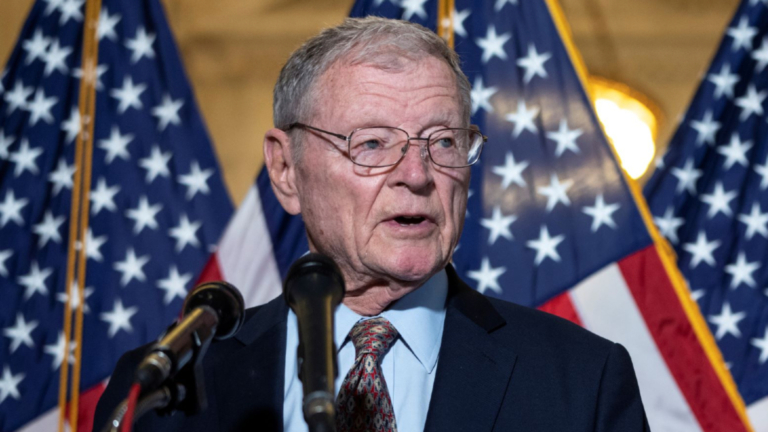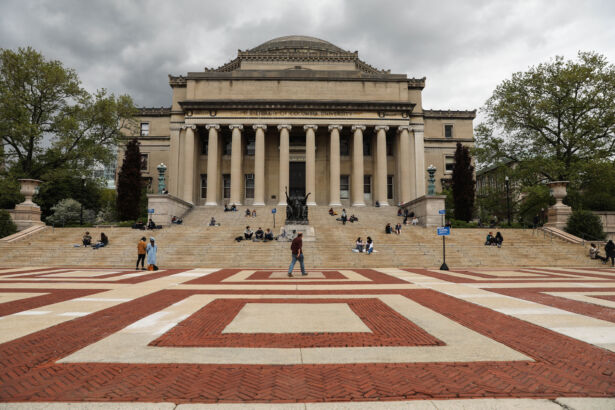Three retiring Republican senators—Roy Blunt of Missouri, Jim Inhofe of Oklahoma, and Richard Shelby of Alabama—received more than $1.5 billion in earmarks contained in the Omnibus Spending Bill of 2022, according to a new analysis by a nonprofit government watchdog.
The Republican trio’s pork barrel projects were among the 7,506 in the bill, worth a total in excess of $16 billion. Earmarks are federal tax dollars requested by individual senators and representatives to be included in larger spending bills for projects in their home states or districts.
Tea Party majority Republicans in the House banned earmarks in 2011 in the wake of controversy prompted in 2005 by Sen. Tom Coburn’s (R-Okla.) disclosure of the $223 million earmark to build two bridges to an island with 50 residents in Southeast Alaska. Senate Republicans followed suit in 2014. Coburn, a pediatrician who died in 2020, famously became known as “Dr. No” among Senate colleagues as a result of his opposition to earmarks.
But earmarks returned to Congress when a majority of congressional Republicans voted with Democrats in 2021 to restore them, but with a new name, “congressionally-directed spending.”

Whereas before the ban, earmarks were often inserted anonymously and veiled in obscure language that could only apply to the favored project, the revised earmarking process includes extensive public disclosure for both the Senate and House.
Shelby and Inhofe received $656.4 million and $510.5 million, respectively, making them the top two earmarkers in Congress. Blunt got $350 million in earmarks, making him number five on the top 10 of congressional earmarkers in 2022, according to Open the Books, an Illinois-based research non-profit that obtains and discloses spending records for all levels of government, and conducts deep-diving analyses.
Another Republican, Sen. Lisa Murkowski of Alaska, ranked third with $489.6 million as Republicans dominated the top 10. Sixth was Rep. Randy Weber of Texas with $287.5 million, while Sen. Lindsay Graham of South Carolina was seventh with $262.1 million, Sen. Bill Cassidy of Louisiana was ninth with $204.7 million and Sen. Susan Collins of Maine was 10th with $200 millions.
Hawaii’s two Democratic senators—Brian Schatz and Mazie Hirono—shared fourth place in the top 10 with $421.6 million, while the retiring Sen. Patrick Leahy (D-Vt.) was eighth overall with $212.5 million.
Despite the dominance of Senate GOPers in the top 10 earmarkers in the 2022 spending bill, Democrats in Congress received more overall in earmarks at $9.1 billion than Republicans, who collectively got $6.4 billion. Another $476 million was jointly requested by members of both parties.
Among the 7,506 earmarks were $1 million to build a splash pad in Center Line, Michigan, $2.5 million for landscaping road medians in La Mirada, California, $3.6 million for the second phase of the Michelle Obama Trail in Atlanta, Georgia, $4 million to renovate a Dallas, Texas, theatre, and $7 million for constructing a new National Korean Museum in Los Angeles.
While earmark advocates often defend the practice as a way individual congressmen can ensure needed federal funding for worthwhile infrastructure projects isn’t blocked by anonymous executive branch bureaucrats, Open the Books identified only $1.6 billion in earmarks for roads, bridges, and highway construction and repairs.

Hundreds of millions of federal tax dollars went to already well-funded private institutions, including $3 million to the Ivy League Columbia University, which has a $13.3 billion endowment, $3.5 million to the Field Museum in Chicago, which has $600 million in assets, and $1 million to the New York Botanical Gardens, almost as much as that facility’s chief executive officer (CEO) is paid, $1.4 million, according to Open the Books.
The retiring senators used significant portions of their earmarks to benefit universities, with Shelby and Leahy, for example, sending $50 million and $30 million respectively to the University of Alabama and the University of Vermont. The funds are for locating their Senate archives on the campuses.
Similarly, Blunt earmarked $61 million to the University of Missouri, which has a $2.2 billion endowment and named a campus facility after him the year before. Blunt also earmarked $30 million to his alma mater, Missouri State University, to renovate the school’s Science Hall, which is named after him.
Another retiring congressman, Rep. Jim Cooper (D-Tenn.), had 10 earmarks worth $17.9 million, including $4 million to the Fisk University John R. Lewis Center for Social Justice—Race Relations Building, and $2.5 million to the Moves & Grooves Center for Art & Innovation. Cooper did not seek re-election in 2022. Nearly $3 million of the total went to projects in Nashville where Cooper’s brother, John, is Mayor.
“We must declare our independence from earmarks. By definition, Congress is picking winners and goofing up the marketplace with highly dislocating favors. Missing is the only earmark that we would support, the $1 million study of Congressional Ego—why must they spend $16 billion of our money on their pet projects,” Open the Books founder and CEO Adam Adrzejewski told The Epoch Times.
From The Epoch Times

